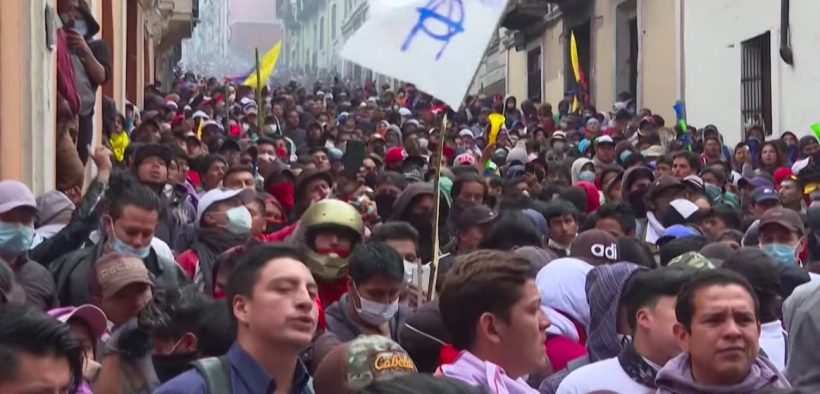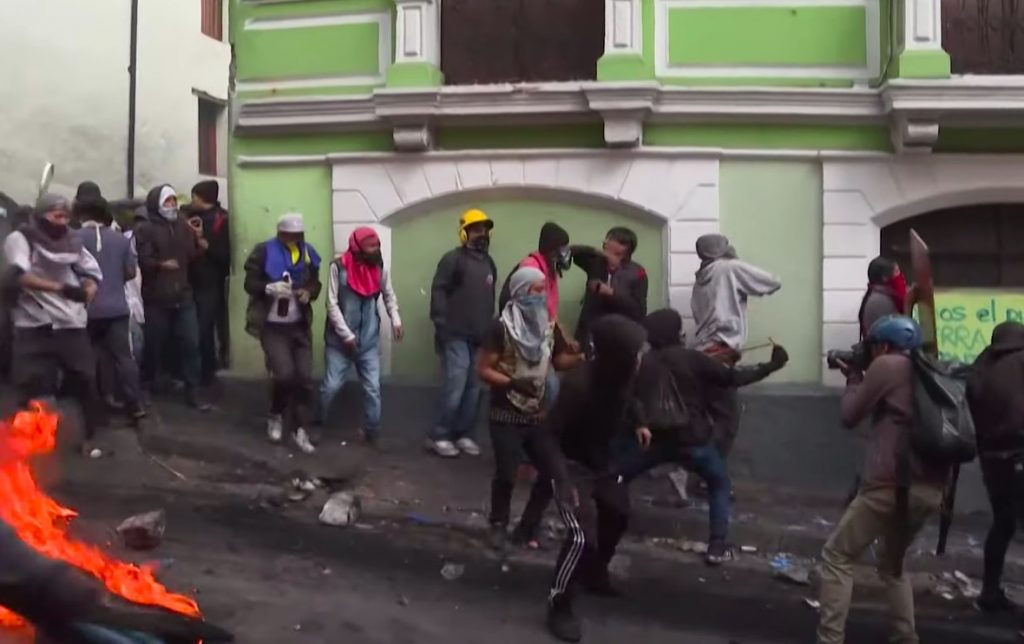Mass Protests Across Ecuador as New IMF Austerity Measures Take Effect

As Ecuador endures a financial crisis, protesters took to the streets to express their anger at newly imposed IMF-forced austerity measures.
An International Monetary Fund (IMF)-backed austerity program that cut a decades-long fuel subsidy and came into effect on Thursday has sparked nationwide protests in oil-rich Ecuador, leaving hundreds arrested and wounded.
During a nationwide strike on Wednesday, October 9, workers’ unions joined indigenous people and students packing the main streets of the country’s capital, Quito. As a result, Ecuadorean President Lenin Moreno was forced to relocate his office to the coastal city of Guayaquil, the country’s second-largest city.
Protesters were angry following the president’s decision to sign an agreement with the global lender to receive a $4.2 billion loan last February. As part of the loan deal, Ecuador must adopt IMF austerity measures including cutting a long-established fuel subsidy. Ecuador’s Economic Minister Richard Martinez claimed the cuts are expected to save the state budget up to $ 2.27 billion per year but will mean an increase in fuel prices for Ecuadorian citizens. Moreno also hopes the IMF economic package would reduce the country’s debt from over $3 billion to $1 billion by 2020.
The Moreno administration also announced it would privatize state-owned telecommunication company CNT and other companies as well as announce massive layoffs from state enterprises. Other measures include reduced day-offs for government workers, lower compensation for outsourced workers and the removal of the four-decade-long fuel subsidy.
Moreno blamed his predecessor, the leftist politician Rafael Correa (now living in exile in Belgium), for causing the crisis. Unlike Correa, who opposed the U.S intervention in Latin America politics, Moreno has taken steps to normalize ties with Washington since he took office in 2017. Some see Moreno’s decision to evict whistleblower and WikiLeaks founder Julian Assange from the Ecuadorean embassy building in London as part of Ecuador’s efforts to the normalize ties with Washington.
Like Venezuela, Ecuador is Oil-Rich But Cash Poor
Ecuador is one of the members of the Organization of Petroleum Exporting Countries (OPEC), thanks to its 4 billion barrel of oil reserves. The country produced 500,000 barrels per day in August 2019.
However, Ecuador announced in early October that its fiscal troubles will force the country to leave OPEC in 2020, presumably in a bid to increase crude production and raise more revenue. Ecuador once left the organization in 1992 over disputes with OPEC quotas and rejoined in 2007.
The debt crisis has forced the government to eliminate the fuel subsidy resulting in price hikes of up to 123%, triggering the nationwide strike and driving Moreno to declare a state of emergency on October 3rd.
According to Reuters, Ecuador previously asked for OPEC’s permission to produce oil exceeding its quota. However, it was never announced how or even whether OPEC responded to the request.
The recent protests also suspended oil operations at three oil blocks (an estimated loss of 165,000 barrels per day or a third of Ecuador’s daily production), as the state oil company Petroamazonas stated.
Criticism of IMF Programs

Protesters staged anti-government rallies Wednesday, October 9, seeking to intensify pressure on Ecuador’s president after a week of unrest sparked by fuel price hikes. (Photo: YouTube, VOA)
Several experts argue that IMF adjustment programs, referred to as Structural Adjustment Programs (SAPs), which promote privatization and subsidy cuts as a condition of receiving loans, have failed to solve recipients’ financial crises and instead left countries worse off.
As Citizen Truth previously wrote, the IMF has historically been wielded as extensions of U.S. power and, along with the World Bank, are often tools to push U.S. geopolitical goals. In fact, a leaked U.S. military guidebook outlines as much in a section titled “Financial Instrument of U.S. National Power and Unconventional Warfare.”
“Some of the best weapons do not shoot,” says the guidebook in reference to how the U.S. relies on financial institutions such as the IMF and the World Bank to act as “unconventional” weapons.
In a report commissioned by the Halifax Initiative entitled Impoverishing a Continent: The World Bank and the IMF in Africa, Asad Ismi details how Structural Adjustment Programs (SAPs) imposed on African nations as a condition of receiving World Bank and IMF loans lead to worsening conditions in Africa.
The SAPs forced African economies to reduce tariffs, cut public spending (including subsidies for food and healthcare), raise interest rates (reducing access to credit), privatize state enterprises and generally open countries doors to Western investors. The foreign investment was supposed to help reduce poverty but instead, the SAPs expanded poverty and inequality as those with means got richer and others were left behind.
“It is more than ironic that the West is complaining about Africa’s debt to China. Since the 1960s Western nations, the IMF, World Bank, Paris Club, etc., have ‘looted’ Africa of hundreds of billions of dollars in bloated debt payments and through the manipulation of currencies and terms of trade,” wrote Lawrence Freeman, an African economic and political analyst, in an article on the Final Call.
Most recently, the IMF was widely criticized for its handling of Greece’s financial crisis. The IMF did admit some mistakes in handling Greece’s bailout in 2010. In an internal report, the IMF said it was too optimistic about the country’s growth assumptions.
“The Fund approved an exceptionally large loan to Greece under an stand-by agreement in May 2010 despite having considerable misgivings about Greece’s debt sustainability. The decision required the Fund to depart from its established rules on exceptional access. However, Greece came late to the Fund and the time available to negotiate the programme was short…
“Market confidence was not restored, the banking system lost 30% of its deposits, and the economy encountered a much deeper than expected recession with exceptionally high unemployment,” the internal report said.
Ecuador’s neighbor Argentina also has a bitter relationship with the IMF and blames IMF austerity measures for the country’s financial crisis in 2001 that pushed millions of middle-class Argentines in poverty.
As a result of the IMF’s failures, the international lender’s image has suffered drastically, yet financially troubled countries are still at times forced to turn to IMF loans for a bailout. Ecuador’s recovery may not be guaranteed, but what is guaranteed is that the IMF will face heightened scrutiny as Ecuador turns to the IMF and new austerity measures are put into place.







